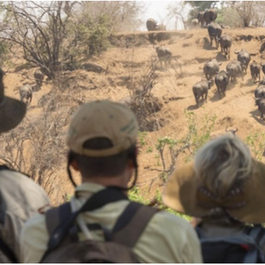
HEALING IN WILDERNESS
Brave the wilderness and find true belonging.
Brene Brown

African Elephant
WILDERNESS IMMERSION
Time spent in wilderness offers a powerful antidote to many of the pressures and complexities of modern living.
Here's How it Helps:
Re-connection with the present
Modern life often pulls us into the future (goals, anxieties) or the past (regrets, memories). In the wilderness, the mind naturally returns to the here and now—whether it’s focusing on a trail, watching wildlife, or simply breathing deeply in nature. This presence reduces rumination and stress.
Rebuilding a sense of belonging
In nature, we reconnect to something larger than ourselves. The vastness of wilderness can soften the ego, helping us feel part of an interconnected web rather than isolated individuals. This combats existential disconnection and fosters humility, awe, and perspective.
Community and authentic connection
When done in groups, wilderness immersion encourages genuine human interaction - conversation without distraction, shared effort, mutual care. This fosters trust, belonging, and emotional safety - key ingredients for healing and growth.
Space for meaning and integration
The simplicity of natural settings creates space for self-reflection and clarity. Without the noise of daily life, people can process their experiences more deeply, reconnect to values, and often find meaning or purpose that felt out of reach before.
Restoration of nervous system balance
The natural world calms the nervous system, for example, lowers cortisol levels and activates the parasympathetic system. This supports nervous system regulation, crucial for healing trauma, anxiety, and burnout.
Detox from digital overload
Time in nature provides a hard reset from constant digital stimulation. Without screens, notifications, or curated feeds, our brains get a break from information fatigue. Studies show this improves attention span, creativity, and emotional regulation.

Physical movement as therapy
Wilderness immersion often involves hiking, paddling, or climbing — embodied movement that releases tension and boosts mood through endorphins. Physical exertion also grounds the body, bringing people out of looping thoughts and into their lived experience.

A Wilderness Trail
What is A Wilderness Trail?
It is not a safari
It is not a hike
It is not an endurance test
A wilderness trail is a deeply personal and profound experience of our connection to the natural world that is very difficult to articulate. It is a carefully facilitated experience of nature and wilderness, guided by expert guides (some of the best in Africa).

A WILDERNESS TRAIL
A Guide to the Trail Process
1. Preparation
Includes talks and discussions about physical challenges, safety issues, aspects of the flora and fauna in the area, and emergency procedures. A considerable part of the preparation is dedicated to potential psychological challenges and personal fears, awareness of feelings that can arise as part of the experience and, importantly, clarification of personal intention for participating.
2. Initiation
Entry into the wilderness area, accompanied by expert psychologist and 2 highly skilled and experienced armed wilderness guides.
3. Immersion
Our skilled experts guide you through your immersive programme - always at your own pace. Intentional and sustainable integration is a key pillar of our treatment approach.
4. Processing & Integration
Treatment focuses on providing a trajectory of continuing healing and growth, including aftercare.

What to Expect
Some aspects of the trail include:
-
Sleeping under the stars, simplicity is key on trail - no cell phones, no watches, no deadlines, everything happens to the rhythm of nature.
-
Each trailsist is required to do 1-2 hours “night watch” a period of keeping the fire going and looking out for potentially dangerous animals whilst the rest of the group sleeps.
-
The trail group becomes a “clan,” teamwork, cooperation and looking out for each other is critical. The trail operates under a principle of Hlonipa (respect in Zulu) -Respect for each other, respect for wildlife and respect for the wilderness
-
Two armed wilderness guides accompany the group, these guides spend 2000+ hours per year in the wilderness area and widely considered some of the best in Africa. We have a 60 year incident free safety record!
-
Days are spent walking between camping sites, distances walked vary from day to day and done in accordance with group dynamics, fitness and needs. Some groups prefer to sit and watch the river go by, others prefer to trek deeper and deeper into the Wilderness.
-
Meals are prepared by the guides who are masters at preparing fresh wholesome meals in the Wilderness and even been featured in several cooking networks.
A WILDERNESS TRAIL
Outdoor Adventure and Experiential Wilderness therapy combined with evidence-based psychotherapeutic practices.





















